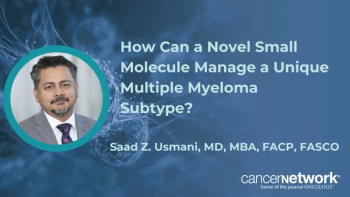
Encorafenib Combo Shows Universal Activity in CRC Prognostic Groups
Additional progression-free survival data from the phase 3 BREAKWATER trial will be presented at future meetings.
In a conversation with CancerNetwork® at the
According to Kopetz, the encorafenib-based regimen produced universal responses across all prognostic groups based on factors such as disease sidedness, age, and location of disease. Response data from the BREAKWATER trial supported the
Looking ahead, Kopetz stated that mature overall survival data and outcomes for the coprimary end point of progression-free survival, which may serve as confirmatory evidence for this approval, will be highlighted at future meetings.
Kopetz is deputy chair for Translational Research and a professor in the Department of Gastrointestinal (GI) Medical Oncology, Division of Cancer Medicine; leader of the Department of Cancer Center Support Grant, GI Program; TRACTION medical director in the Division of Therapeutics Discovery Division; and associate vice president for Translational Integration at The University of Texas MD Anderson Cancer Center.
Transcript:
This combination was associated with activity across all the usual prognostic groups [related to] sidedness, location of disease, age, and region. It showed that this effect of a higher response rate was something that was seen universally.
As a result of this overall response rate, in accordance with the FDA Project FrontRunner, the regimen received an approval by the FDA last month. I am pleased that this is now a new standard of care for this population. We look forward to seeing the other coprimary end point, progression-free survival—as well as the mature overall survival—at future meetings, with the acknowledgement that there’s encouraging survival signals seen already, but that the significance is not yet established.
The accelerated approval, again, based on the Project FrontRunner, is dependent on the other coprimary end point reading out positively, which is the progression-free survival that will be presented at a future meeting.
References
- Kopetz S, Yoshino T, Van Cutsem E, et al. BREAKWATER: Analysis of first-line encorafenib + cetuximab + chemotherapy in BRAF V600E-mutant metastatic colorectal cancer. J Clin Oncol. 2025;43(supp 4):16. doi:10.1200/JCO.2025.43.4_suppl.16
- FDA grants accelerated approval to encorafenib with cetuximab and mFOLFOX6 for metastatic colorectal cancer with a BRAF V600E mutation. FDA. December 20, 2024. Accessed January 25, 2025. https://tinyurl.com/4jakczas
Newsletter
Stay up to date on recent advances in the multidisciplinary approach to cancer.





































